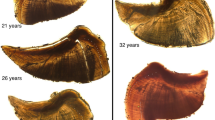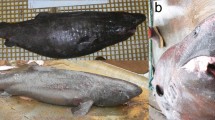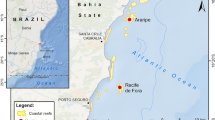Abstract
This study examined the effect of fishing on the abundance and species richness of families of coral reef fish at two islands (Sumilon and Apo) in the Philippines from 1983 to 1993. Natural fishing experiments occurred in marine reserves at each island, where long term estimates of fishing intensity were available. Responses to fishing were interpreted in terms of life histories of fish. The intensity of fishing and fish life histories were generally good predictors of the differential rates of decline and recovery of abundance in response to fishing. Large predators had vulnerable life histories (low rates of natural mortality, growth and recruitment) and were subjected to high intensity fishing. They declined significantly in density when fished and increased significantly but slowly when protected from fishing. Caesionidae, a family with a life history resilient to fishing (high rates of natural mortality, growth and recruitment) but fished intensively also declined rapidly in abundance when fished. Thus, knowledge of life history alone was insufficient to predict response to fishing. Acanthuridae were fished relatively hard and had a life history of intermediate vulnerability but displayed weak responses to fishing. Thus level of fishing intensity alone was also not sufficient to predict response to fishing. For Chaetodontidae, effects of fishing conformed to expectations based on life history and fishing intensity at one island but not the other. Three families with intermediate vulnerability and subjected to intermediate to light fishing (F. Scaridae, Labridae and Mullidae) displayed predictably weak responses to fishing, or counter-intuitive responses (e.g., increasing in abundance following fishing). These counter-intuitive responses were unlikely to be secondary effects of increase in prey in response to declines of predators. Two lightly-fished families with resilient life histories (F. Pomacentridae, Sub F. Anthiinae) predictably displayed weak numerical responses to fishing except during a period of use of explosives and drive nets.
Similar content being viewed by others
Author information
Authors and Affiliations
Additional information
Accepted: 30 June 1998
Rights and permissions
About this article
Cite this article
Russ, G., Alcala, A. Natural fishing experiments in marine reserves 1983 – 1993: roles of life history and fishing intensity in family responses. Coral Reefs 17, 399–416 (1998). https://doi.org/10.1007/s003380050146
Issue Date:
DOI: https://doi.org/10.1007/s003380050146




